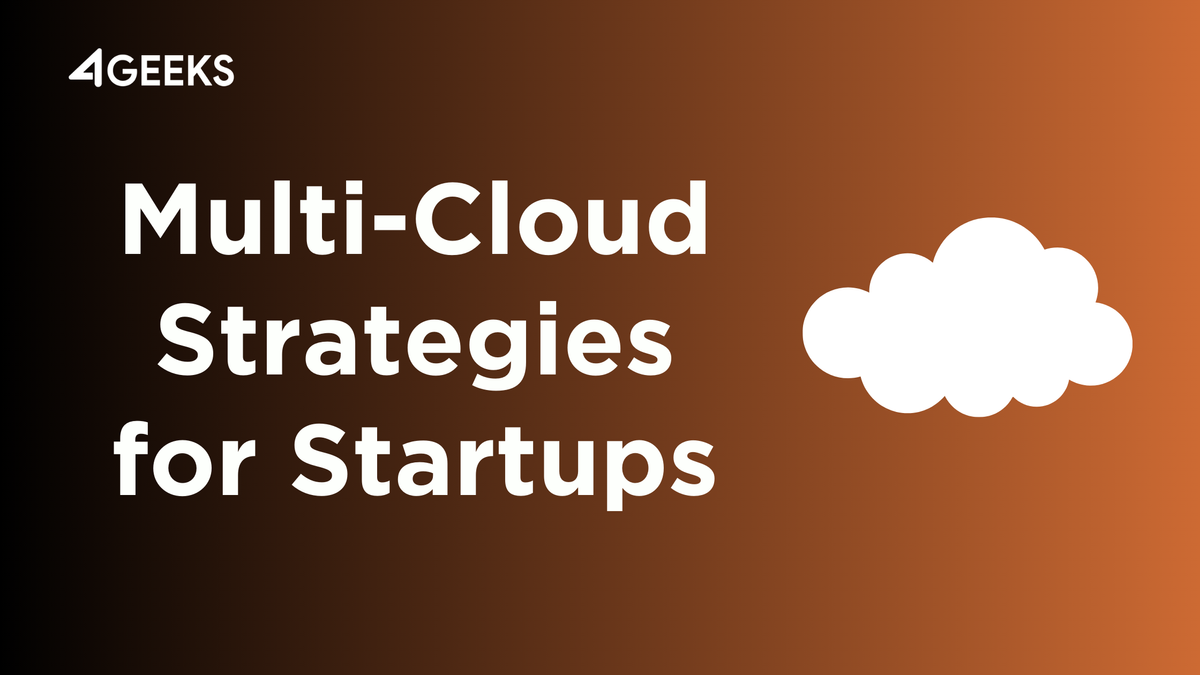Multi-Cloud Strategies for Startups: A Deep Dive into Leveraging the Best of AWS, Google Cloud, and Azure

In today's hyper-competitive digital landscape, startups need to be nimble, adaptable, and constantly innovating to thrive. Cloud computing offers a flexible and scalable solution for startups to build and deploy applications quickly and cost-effectively, but choosing the right cloud provider can be a complex decision.
This article delves deeper into the multi-cloud strategy, exploring its benefits and challenges for startups, providing guidance on selecting the right cloud providers for specific needs, and showcasing successful case studies.
Benefits of Multi-Cloud for Startups
- Enhanced Flexibility and Scalability: By leveraging multiple cloud platforms, startups can seamlessly scale their infrastructure and resources up or down based on changing demands, ensuring agility and responsiveness to market fluctuations.
- Avoid Vendor Lock-in: Multi-cloud prevents startups from becoming dependent on a single vendor, affording them the freedom to choose the best-in-class services for each workload, optimizing performance and functionality.
- Reduced Costs: Through strategic workload distribution across various platforms, startups can optimize costs and avoid paying for unnecessary features. Additionally, leveraging the competitive pricing models and promotions offered by various cloud providers can further enhance cost efficiency.
- Improved Disaster Recovery and Business Continuity: Distributing workloads across multiple cloud environments minimizes the impact of outages and service disruptions on business operations, ensuring high availability and resilience.
- Increased Innovation and Access to Cutting-edge Technologies: By accessing the diverse range of services and features offered by each cloud provider, startups gain access to cutting-edge technologies like AI, machine learning, and advanced analytics, driving innovation and creating new competitive advantages.
Challenges of Multi-Cloud
- Increased Management Complexity: Managing multiple cloud environments can be complex and require a skilled team with expertise in various cloud platforms. This can be a challenge for startups with limited resources.
- Security and Compliance Concerns: Maintaining consistent security policies and compliance requirements across different cloud platforms can be a significant challenge, requiring careful planning and implementation of robust security measures.
- Limited Visibility and Control: Without centralized tools for monitoring and managing resources across various cloud environments, startups may experience limited visibility into their infrastructure, potentially leading to inefficient resource allocation and performance optimization challenges.
Selecting the Right Cloud Providers
Each major cloud provider has its own strengths and weaknesses, making choosing the best fit for your startup crucial. Here's a closer look at the top contenders:
- AWS: The market leader with the most extensive range of services and features, ideal for mature startups requiring comprehensive solutions and extensive functionalities.
- Azure: Offers strong integration with Microsoft products and services, making it a suitable choice for startups already invested in the Microsoft ecosystem and seeking seamless integration with existing tools and technologies.
- Google Cloud: Provides competitive pricing and leads the way in AI and machine learning capabilities, making it a compelling option for startups focused on data-driven innovation and cutting-edge technology adoption.
Case Studies of Successful Multi-Cloud Implementations
- Netflix: Leverages a multi-cloud strategy across AWS, Azure, and Google Cloud to achieve unparalleled high availability and global scalability for its streaming service, ensuring seamless delivery of content to millions of users worldwide.

- Spotify: Utilizes a multi-cloud approach to optimize costs and leverage the best features from each provider for its music streaming platform, achieving a balance between cost-efficiency and performance.

- Dropbox: Employs a hybrid cloud approach, combining AWS with its own data centers, to offer a secure and scalable storage solution for its massive user base, ensuring data privacy and robust data management.
Additional Resources for Further Learning
- "Multi-Cloud Management for Dummies" by Judith Hurwitz, Robin Bloor, and Marcia Kaufman
- "The Multi-Cloud Imperative: How to Balance Public Clouds for Business Advantage" by Michael Coté
- "Cloud Strategy for Startups: The Definitive Guide to Public, Private, and Hybrid Cloud" by Michael J. Fauscette
- "The Cloud Computing Handbook" by John Rittinghouse and James Ransome
Conclusion
While a multi-cloud strategy offers numerous benefits for startups, careful planning, implementation, and ongoing management are crucial for success. By thoroughly assessing individual needs, selecting the right cloud providers, and implementing robust security and management practices, startups can leverage the full potential of the multi-cloud approach and gain a significant competitive advantage in today's dynamic and evolving digital landscape.
As we stand at the precipice of a transformative era in cloud computing, the multi-cloud approach presents a paradigm shift for startups seeking to navigate the dynamic and competitive digital landscape. By strategically leveraging the diverse strengths of multiple cloud providers, startups can unlock a plethora of benefits, including:
- Enhanced agility and scalability: Seamlessly adapt to changing market demands and scale resources quickly,ensuring uninterrupted operations and responsiveness to emerging opportunities.
- Freedom from vendor lock-in: Choose the best-in-class services for each specific workload, optimizing performance and functionality without being beholden to a single cloud vendor.
- Reduced costs: Optimize resource allocation and leverage competitive pricing models to achieve cost efficiency without compromising on performance or innovation.
- Increased resilience and disaster recovery: Minimize the impact of outages and service disruptions on business operations by distributing workloads across multiple cloud environments.
- Unprecedented access to cutting-edge technologies: Stay at the forefront of innovation by accessing advanced technologies like AI, machine learning, and data analytics offered by various cloud providers.
However, implementing a successful multi-cloud strategy requires careful planning and execution. Thoroughly assess your individual needs, understand the strengths and weaknesses of each cloud provider, and select the combination that best aligns with your unique requirements. Implement robust security and management practices to ensure consistent data privacy, compliance, and control across all cloud environments.
As the case studies of Netflix, Spotify, and Dropbox demonstrate, a well-defined multi-cloud strategy can propel startups towards remarkable success. By embracing the flexibility, scalability, and innovation that this approach offers, startups can achieve unprecedented agility, resilience, and growth in the ever-evolving digital landscape.
The multi-cloud journey is not without its challenges, but the potential rewards are immense. By equipping yourselves with the knowledge, resources, and expertise outlined in this article, you can confidently embark on this transformative journey and unlock the full potential of the multi-cloud future for your startup.
Remember, the cloud is not just a destination; it is a powerful tool that can empower your startup to reach new heights and achieve sustainable growth.
Embrace the opportunities it presents, navigate the challenges wisely, and leverage the best of what each cloud provider has to offer. The future of your startup lies in the cloud, and a multi-cloud approach can be your key to unlocking boundless success.




